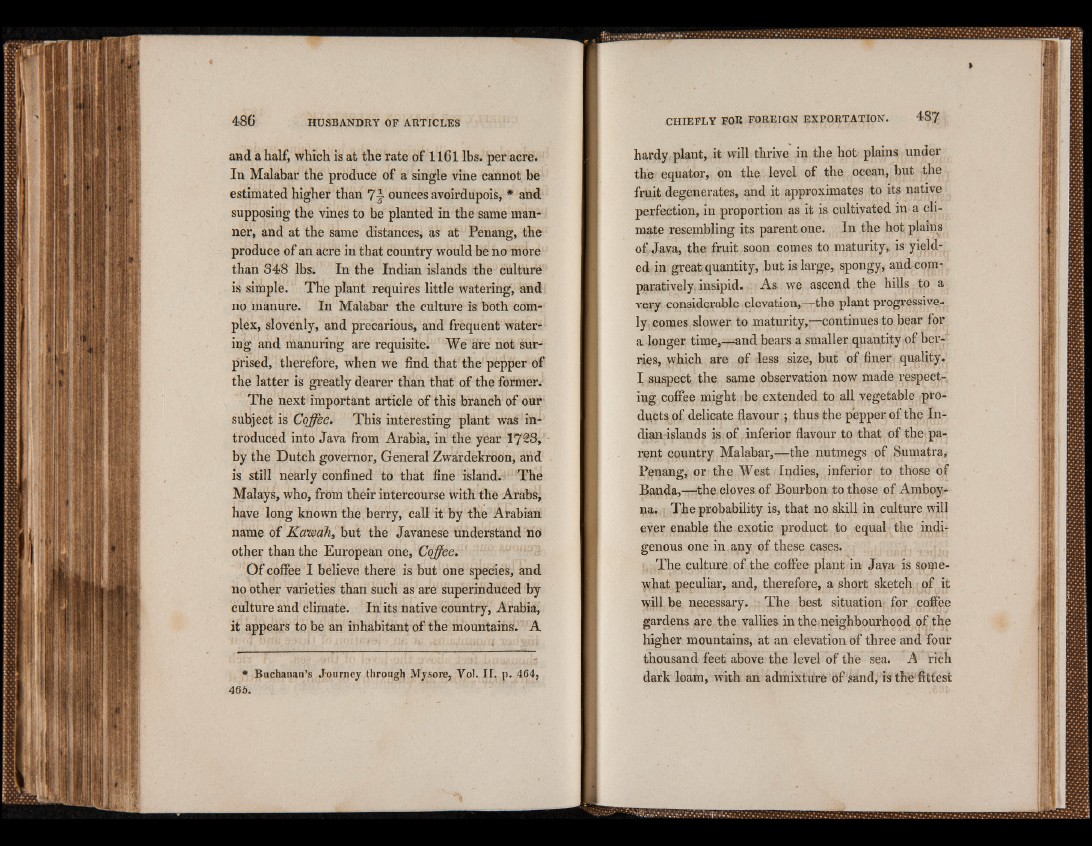
and a half, which is at the rate of 1161 lbs. per acre.
In Malabar the produce of a single vine cannot be
estimated higher than 7J- ounces avoirdupois, * and
supposing the vines to be planted in the same manner,
and at the same distances, as at Penang, the
produce of an acre in that country would be no more
than 348 lbs. In the Indian islands the culture
is simple. The plant requires little watering, and
no manure. In Malabar the culture is both complex,
slovenly, and precarious, and frequent watering
and manuring are requisite. We aire not surprised,
therefore, when we find that the pepper of
the latter is greatly dearer than that of the former.
The next important article of this branch of our
subject is Coffee. This interesting plant was introduced
into Java from Arabia, in the year 17^3,
by the Dutch governor, General Zwardekroon, and
is still nearly confined to that fine island. The
Malays, who, from their intercourse with the Arabs,
have long known the berry, call it by the Arabian
name of Kawah, but the Javanese understand no
other than the European one, Coffee.
Of coffee I believe there is but one species, and
no other varieties than such as are superinduced by
culture and climate. In its native country, Arabia,
it appears to be an inhabitant of the mountains. A
* Buchanan’s J-ourncy through Mysore, Vol. II, p. 464,
466.
hardy plant, it will thrive in the hot plains under
the equator, on the level of the ocean, but the
fruit degenerates, and it approximates to its native
perfection, in proportion as it is cultivated in a climate
resembling its parent one. In the hot plains
of Java, the fruit soon comes to maturity, is yielded
in great quantity, but is large, spongy, and,comparatively
insipid. As we ascend the hills to a
very considerable elevation,—the plant progressively,
comes slower to maturity,—continues to bear for
a longer time,—and bears a smaller quantity of berries,
which are of less size, but of finer< quality.
I suspect the same observation now made respecting
coffee might be extended to all vegetable products
of delicate flavour ; thus the pepper of the Indian
islands is of inferior flavour to that of the parent
country Malabar,—-the nutmegs of Sumatra,
Penang, or the West Indies, inferior to those of
Banda,—the cloves of Bourbon to those of Amboy-
na. The probability is, that no skill in culture will
ever enable the exotic product to equal the indigenous
one in any of these cases.
, The culture, of the coffee plant in Jaya is somewhat
peculiar, and, therefore, a short sketch of it
will be necessary. The best situation- for coffee
gardens are the vallies in the ¡neighbourhood of the
higher mountains, at an elevation of three and four
thousand feet above the level of the sea. A rich
dark loam, with an admixture of sand, is the fittest